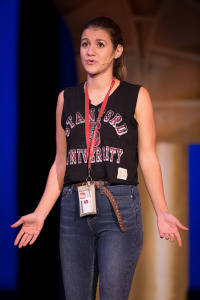On Wednesday, for the 103rd year in a row (ignoring a fluke year in the 1970s), Stanford students presented the first night of Gaieties, the entirely student-run show that has long been a hallmark tradition. First performed as the “Football Follies” in the early 20th century, Gaieties focuses on Stanford’s rivalry with UC Berkeley in anticipation of the Big Game the following weekend.

Although Stanford has many theater groups and productions, Gaieties is a very different experience. Heather Kramer ’18, an actor in the show, said she has enjoyed participating in Gaieties because it allows her to keep doing musical theatre but in a unique way.
“It was still theater, it was still the thing I really liked to do, but it was also a more fun, outrageous…just kind of more crazy than the stuff I’d usually done,” Kramer said . “It was fun to be in something where it’s like, we don’t take ourselves seriously.”
This year, Gaieties has a cast of 24 in addition to writers, producers, directors, costume and set designers, tech crew and other staff.
Creating a well-received Gaieties isn’t easy, said Keegan Livermore ’16, producer of this year’s Gaieties.
“I feel like there’s this fear within Gaieties that [the show is] hit or miss,” Livermore said. But there are certain components that make success more likely. He said one essential element in any good Gaieties production is having good villains. Another is including the audience.
“A lot of it is…just seeing how much of campus we could work into the script,” Livermore said. “It’s much easier to engage with the show if you can see how, say, a student group you’re involved in is being portrayed on stage.”
Preparation for the show begins about a year in advance, when the producer is hired in February. From there, the producer hires the director, composer, lyricist and two head writers. Along with a staff of five to eight writers, the head writers produce a script over the course of seven weeks during spring quarter. Over the summer, an administrator with Student Activities and Leadership (SAL) has to approve the script and ensure its appropriateness.
“In some ways, [preparation is] very similar to the way that Band goes over their field shows,” Livermore said.
But the script is only one part of the long writing process leading up to the performance. Music is also a huge component of the show, and composer and lyricist Nathan Tindall ’16 has been working for months to create the musical components.
“The music is not the Bible,” Tindall said. “So definitely there’s been an elastic editing process that still is going on, trying to coordinate between myself and the music director.”
In addition to composing the score, Tindall is also responsible for writing the lyrics, which he said is an entirely different process.
“It has to make sense,” he explained. “You have to avoid the feeling that it’s like ‘insert song here.’ The characters interact in the song that fits in with the plot.”
Gaieties is put on by the Ram’s Head Theatrical Society, a Stanford theater group that has existed since 1911. The group has an established presence on Stanford’s campus, meaning that their shows are usually well-attended and well-received. And according to Ram’s Head’s executive producer Nisha Masharani ’15 that presence is only growing.
“I think we’ve gotten bigger and better,” Masharani said. “We’ve always had very high production quality and…really talented actors and really talented directors…I think we’ve just gotten more and more ambitious.” Masharani gave the example of last year’s spring show, Les Mis, which had a cast and crew of over 100.
In addition to Gaieties, Ram’s Head puts on at least two other shows each year: Winter One Acts during the winter and another show during the spring, which last year was “Les Miserables” and this year will be “Hairspray.” Winter One Acts consists of three or four student-written plays. Masharani also expressed her confidence that Winter One Acts is growing as well.
“It was a large number but it was also a lot of incredibly good shows,” Masharani said, referring to the student submissions Ram’s Head received for Winter One Acts this year. “We were really, really lucky. It looks like there’s some amazing writers on this campus now, and so we’re really excited about getting shows for the next couple years from, again, really talented people.”
Although Ram’s Head’s other productions and other theater groups on campus may be gaining popularity, Gaieties still stands apart as a unique and distinctive Stanford tradition, as Kramer articulated.
“I’ll probably try and do other stuff with Ram’s Head, but nothing will be quite like Gaieties,” Kramer added.
Contact Sarah Wishingrad at swishing ‘at’ stanford.edu.